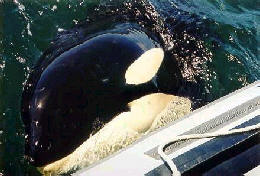|
The officials said they agreed to attempt to relocate the whale, officially named L98, but nicknamed Luna, because they fear he is in danger.
A scientific panel recommended intervention last month after reports emerged that L98 had been injured by collisions with float planes and by humans upset by his interfering with watercraft.
Killer whales are social animals and experts speculate that L98 is seeking the attention because he is lonely.
However, it is not known if his family pod will accept him.
The orcas off the Washington state and British Columbia coasts normally spend their lives swimming in family groups.
Scientists have been struggling over what to do with the young orca since he was discovered in July 2001 swimming alone in Nootka Sound on the west coast of Vancouver Island.
Experts do not know if L98 was accidentally separated from, or forced to leave, his family pod, known as L pod. It spends summer and fall south of the Island in the Strait of Juan de Fuca, at least 160 miles (160 miles) away.
Canada's Department of Fisheries and Oceans (DFO) said it will work out the details of a relocation plan with U.S. officials and private groups.
L pod normally stays in the area until late November before leaving to winter deeper in the Pacific, officials said.
Officials warned that if the pod does not accept L98 back, they will have to take more steps to protect him since Strait of Juan de Fuca has heavy marine traffic.
"If it fails, DFO may need to consider other options, including captivity or other permanent means of dealing with Luna," the department said.
Officials last year reunited a young female orca found orphaned and injured near Seattle with her family pod that spends the summer more than 400 miles to the north in Canadian waters.
Story by Allan Dowd
Reuters News Service
Top
|
